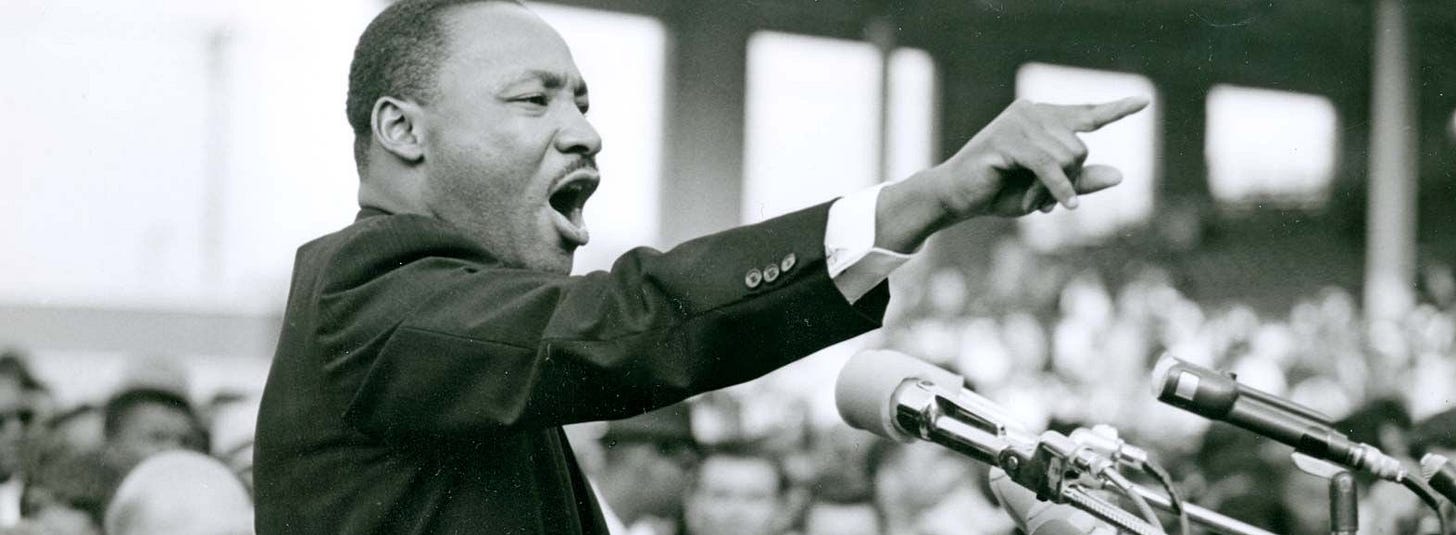Today I am thinking about MLK.
He is one of my heroes. May his life inspire us to do better.
On this MLK day, I remember. Buried deep in the misty memory of childhood, I recall the assassination of Martin Luther King. I don’t remember details from that day, but I do remember my parents’ reaction and understood that someone great was gone. I knew he was killed for no good reason but hatred and racism. I didn’t personally know a black person when I was small. All I knew of them was what I saw on TV. And in the late 1960s, every evening in black and white, protests and riots and wars played out on the nightly news on my parent’s television set. I was fascinated by that screen and, whenever it was on, my eyes were glued to it. My mother recalled me coming into the kitchen while the news played scenes of frightened young American soldiers in a Southeast Asian jungle. I asked her if I would have to do what they were doing when I grew up. That haunted her at the time. Similar scenes of firehoses turned on black Americans left a deep impression upon my mind. When members of the U.S. Olympic team stood on the medal stand with their heads bowed and fists raised during the national anthem, I wondered why so many adults around me seemed appalled. As I got older, my parents and my schools offered context. Having moved to a town with an African-American community and desegregated schools by the age of 10, the unrest of the 60s was given context and lifted up figures like MLK as heroes. I admired him and other civil rights leaders who called us as a nation to come together and be better than we have been.
Maya Angelou said “You did what you knew how to do, and when you knew better, you did better.”
As I grew into adulthood, I thought that my country knew better and was doing better. I was born 9 days short of JFKs inauguration, so technically I was an Eisenhower baby. I don’t know if my parents voted for Ike, but I know they voted for Kennedy. They were still in school when I was a baby and I was taught ideals that emphasized doing good and wishing well for all humanity. Given my upbringing, it should not be surprising that the words of MLK would resonate with me. My decision to be a preacher myself was inspired more by his and other sermons from the civil-rights movement; more than those I heard in the rural and small-town Baptist churches I grew up in. The idealism of MLK and other preachers of the civil rights era sprang from the North American version of liberation theology inspired by the theologian Howard Thurman and the activism of preachers like Clarence Jordan who wrote the Cotton Patch Gospel and founded the Koinonia farm in Southwest Georgia.
I’m still an idealist. On this day, instead of thinking about an inauguration of another president, I’m thinking about the man whose birthday we celebrate today. On the night before he was assassinated, Dr. King gave a speech in Memphis in support of the striking sanitation workers in Memphis, Tennessee. One statement he made that evening stands out to me today:
“The nation is sick. Trouble is in the land; confusion all around…. But I know, somehow, that only when it is dark enough, can you see the stars.”
What a frightful and, at the same time, a beautiful picture of hope for when a nation was descending into darkness.



Thank you, James, for sharing your experiences and the shaping of your values this way. I was mostly oblivious to the continuing racial struggles that existed in our country until I was about 10. A visit to the lunch counter at a dime store in Columbia, MO raised my awareness, as my mom and I observed 2 Black women being completely ignored as they waited to be served. I was shocked! I had no idea that those things still happened in America! May we never forget the sacrifices that Dr. King and those who surrounded him made as they led the struggle.